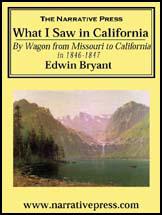Edwin Bryant

Edwin Bryant was born in Massachusetts in 1805. Bryant moved to Kentucky where he became a journalist. In 1846 Bryant became the leader of a wagon train travelling overland from Independence, Missouri to the west coast of America. It has been estimated that in 1846 around 250 wagons and 1,500 people assembled at Independence to journey to California and Oregon. This was also the year of the Donner Party, the worst disaster in wagon train history, when forty-two emigrants and two Indian guides died on the journey.
In 1848 Bryant published an account of his experiences called What I Saw in California: By Wagon From Missouri to California. Bryant served as a alcalde before returning east with General Stephen Kearny. He was also a witness in the court-martial of John C. Fremont.
Bryant also took part in the Californian Gold Rush and was active in local politics. Edwin Bryant retired to Louiseville, Kentucky, where he died in 1869.
Primary Sources
(1) Edwin Bryant, What I Saw in California (1849)
We continued along the banks of the Little Blue until noon, when the trail diverged from the stream to the right, ascending over the blufffs, into the high table-land of the prairie, in order to strike the Platte river, the estimated distance of which from this point is twenty-seven miles. We supplied ourselves with water and wood, expecting to encamp tonight where neither of these could be obtained.
About two o'clock, p.m., in crossing a ravine the bank of which was steep, one of the axletrees of our wagon broke down entirely... The train "rolled" past us, but a number of men sufficient to assist in repairing the damage to our vehicle remained. The tools with which we had provided oursleves in the event of accidents, consisting of a saw, shaving-knife, augers, chisels, hammers, etc. etc., were now found indispensible. With the aid of these, Mr. Eddy, a carriage-maker by trade, was soon as busily at work in adjusting the new axletree to the size of the irons appertaining to the wheels, as if he had been in his own shop at home.
(2) Edwin Bryant arrived at Fort Bridger in the summer of 1846. He wrote about it in his book, What I Saw in California (1849)
Circles of white-tented wagons may now be seen in every direction, and the smoke from campfires is circling upwards, morning, noon and evening. An immense number of oxen and horses are scattered over the entire valley, grazing upon the green grass. Parties of Indians, hunters, and emigrants are galloping to and fro, and the scene is one of almost holiday loveliness. It is difficult to realize that we are in a wilderness, a thousand miles from civilization. I noticed the lupin and a brilliant scarlet flower in bloom.
(3) Charles T. Stanton, wrote from Independence to his brother Sidney Stanton (5th July, 1846)
Yesterday we celebrated the 4th of July. The breaking one or two bottles of good liquor, which had been hid to prevent a few old tapsters from stealing, (so thirsty do they become on this route for liquor, of any kind, that the stealing of it is thought no crime), a speech or oration from Colonel Russell, a few songs from Mr. Bryant, and several other gentlemen, with music, consisting of a fiddle, flute, a dog drum - the dog from which the skin was taken was killed, and the drum made the night previous - with the discharge of all the guns of the camp, at the end of speech, song and toast, created one of the most pleasurable excitements we have had on the road.
(4) Edwin Bryant, What I Saw in California (1849)
I remained at Sutter's Fort .... On the 28th October, Mr. Reed, whom I have before mentioned as belonging to the rear emigrating party, arrived here. He left his party on Mary's river, and in company with one man crossed the desert and the mountains. He was several days without provisions, and when he arrived at Johnson's, was so much emaciated and exhausted by fatigue and famine, that he could scarcely walk. His object was to procure provisions immediately, and to transport them with pack-mules over the mountains for the relief of the suffering emigrants behind. He had lost all of his cattle, and had been compelled to cache two of his wagons and most of his property. Captain Sutter generously furnished the requisite quantity of mules and horses, with Indian vaqueros, and jerked meat, and flour. This is the second expedition for the relief of the emigrants he has fitted out since our arrival in the country.
